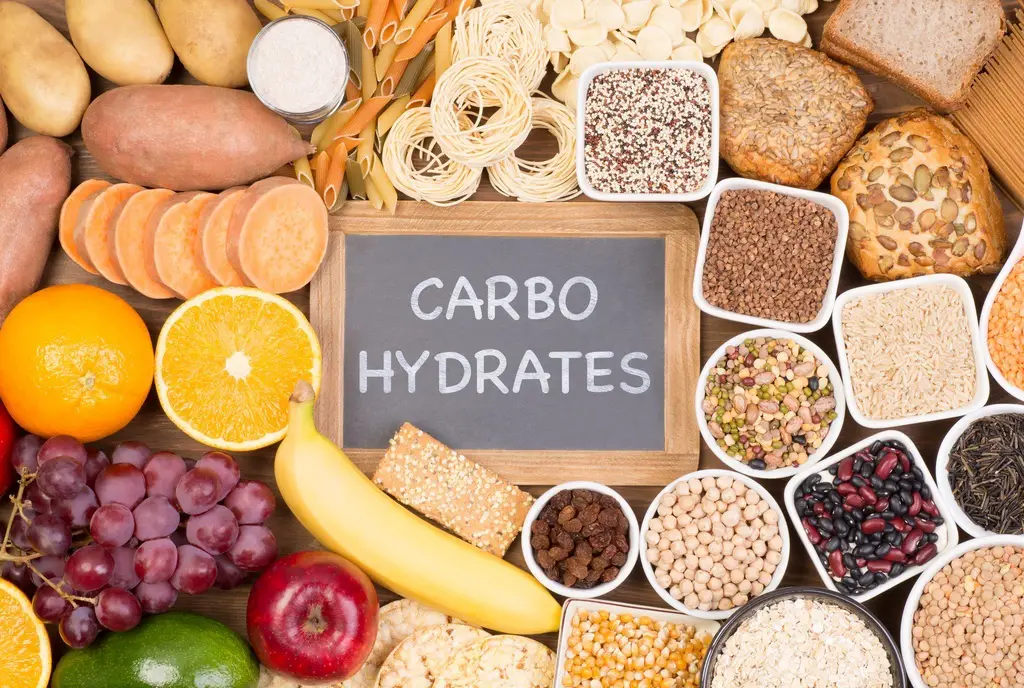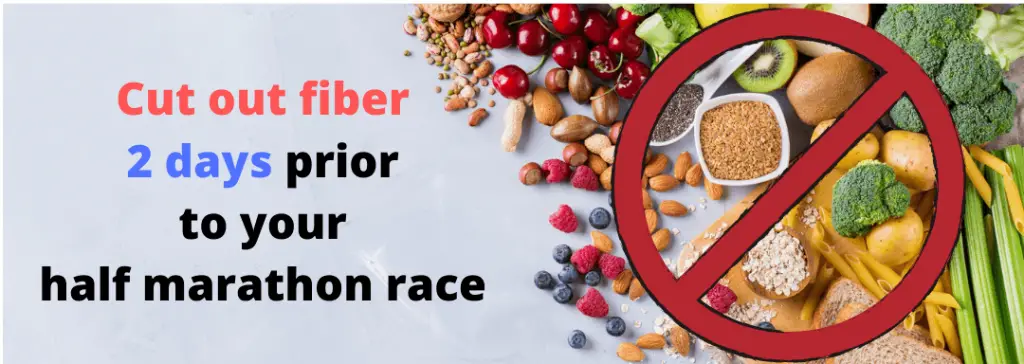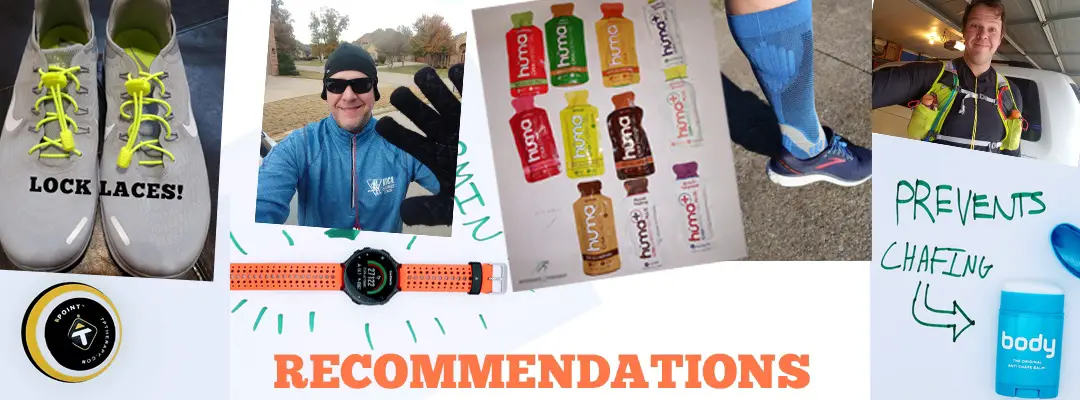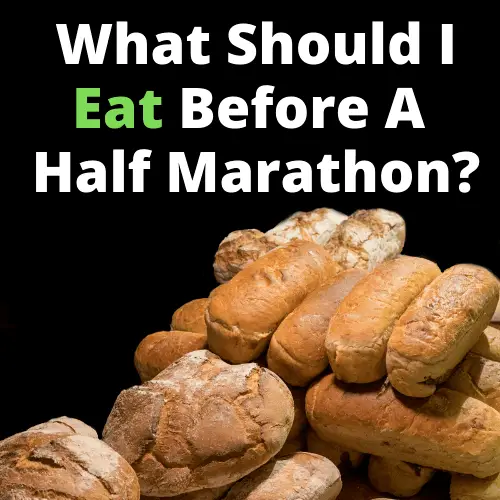Not only do new runners sometimes struggle with their long runs, but they also have trouble nailing their nutrition and fueling for a successful half marathon. Based on my own experience, one of the biggest reasons why is that it differs from runner to runner. While following a training schedule is simple, figuring out what to eat becomes a little more complex.
What Should I Eat Before a Half Marathon?
Your meal before your half marathon should range from 300 to 500 calories (60 to 100 grams of carbohydrates) 2 hours or longer prior to your race. Try to eat a morning meal that is comprised mainly of carbohydrates (or 80% carbohydrates with 20% protein). Avoid eating foods with fiber the morning of your half marathon race.
Even though nutrition and fueling vary from runner to runner, there is scientific research that shows optimal performance for running when a certain amount of carbs are eaten prior to a race. Knowing what to eat prior to your race is only half of the battle. The other half of your fueling needs are waiting for you on the racecourse. I have written an extensive article about fueling during the race and post-recovery nutrition.

Do I really need to eat 500 calories before a half marathon?
Depending on how fast you finish the race will ultimately guide you to the answer of how many calories do you need before a half marathon race. Let’s look at multiple finish time scenarios:
- Finish time will be under 1:30 – you probably can get away with only 100 calories (25 carbs – one banana) followed by fuel on the race.
- Finish time will be under 2:00 – you probably can get away with 200-300 calories (40-70 grams of carbohydrates) for a morning meal
- Finish time will be under 2:30 – you probably can eat 400-500 calories (80-110 grams of carbohydrates)plus fuel during the race
- Finish time will be over 2:30 – you probably can eat 500-600 calories (100-130 grams of carbohydrates) plus fuel during the race
I personally am not a fast racer my best time is 2:09 and my worst time is 2:25. I always eat 500 calories which have never done me wrong for any of my half marathon races. However, these results are typical for me and possibly won’t work for you. It’s important to test your morning meals prior to your long run training sessions and not the morning of your half marathon race.
Don’t let this get too complicated. The longer you’re going to be on the racecourse the more energy you’ll require.
Breakfast before a half marathon
I personally stick to only one food source for breakfast in the morning. I like minimal preparation for my long runs and race morning meals. I eat 5 servings of a cinnamon swirl bread. Each slice of bread is 100 calories with 20 grams of carbohydrates each. This meal fits my 500 calorie budget (100 grams of carbohydrates) about 2 hours before my race. Other good suggestions are bagels, yogurt, bananas, and oatmeal. Some people will eat 2 pancakes which are roughly about 400 calories total. Others might eat a peanut butter and jelly sandwich which offers about 350 calories with about 35-40 grams of carbohydrates. Other good sources of carbohydrates are brown rice, beans, whole oats, and 100% whole-grain cereal.
I wouldn’t recommend eating less than 80 grams of carbohydrates prior to your half marathon race.
How Many Hours Before A Half Marathon Should I Eat?
Good guidelines to follow for a pre-race meal prior to your half marathon:
- 2 hours out – 300-500 calories
- 4 hours out – up to 1000 calories
Since most races are early in the morning, most runners will not get up 4 hours before their race. I recommend sticking with the 300-500 calories 2 hours before your race. Sacrificing your sleep to eat another 500 calories is not a good idea.

How many carbohydrates should I eat before a half marathon?
The amount of carbohydrates you’ll need depends on the racer. I wouldn’t recommend eating less than 60 grams of carbohydrates for the morning meal before your race. I would typically aim for about 100 grams of carbohydrates. Again, testing is what it takes to figure out how much fuel you ultimately need when racing. During your long run training sessions if you ate only 40 grams of carbohydrates and started to feel tired about an hour in then you probably need to add in another 40 grams of carbohydrates. Also, when you’re testing your meals prior to long runs make sure and only change one variable at a time so that you can nail your pre-race fueling requirements.
A good guideline to follow is to eat 1 gram of carbohydrate for 1 kilogram of weight. Look at the table below:
Amount of Carbohydrates You Should Consume before Your Half Marathon Race
1 g per 1 kilogram of body weight should be used for meals that are 2 hours prior to your race time
2 g per 1 kilogram of body weight should be used for meals that are 4 hours prior to your race time
Some runners, espeically ultra endurance runners will eat 3 to 4 grams of carbohydrates per 1 kilogram of body weight.
| Weight (lbs) | 1 g per 1 kg | 2 g per 1 kg |
|---|---|---|
| 100 | 45 | 91 |
| 105 | 48 | 95 |
| 110 | 50 | 100 |
| 115 | 52 | 105 |
| 120 | 55 | 109 |
| 125 | 57 | 114 |
| 130 | 59 | 118 |
| 135 | 61 | 123 |
| 140 | 64 | 127 |
| 145 | 66 | 132 |
| 150 | 68 | 136 |
| 155 | 70 | 141 |
| 160 | 73 | 145 |
| 165 | 75 | 150 |
| 170 | 77 | 155 |
| 175 | 80 | 159 |
| 180 | 82 | 164 |
| 185 | 84 | 168 |
| 190 | 86 | 173 |
| 195 | 89 | 177 |
| 200 | 91 | 182 |
| 205 | 93 | 186 |
| 210 | 95 | 191 |
| 215 | 98 | 195 |
| 220 | 100 | 200 |
| 225 | 102 | 205 |
| 230 | 105 | 209 |
| 235 | 107 | 214 |
| 240 | 109 | 218 |
| 245 | 111 | 223 |
| 250 | 114 | 227 |
| 255 | 116 | 232 |
| 260 | 118 | 236 |
| 265 | 120 | 241 |
| 270 | 123 | 245 |
| 275 | 125 | 250 |
| 280 | 127 | 255 |
| 285 | 130 | 259 |
| 290 | 132 | 264 |
| 295 | 134 | 268 |
| 300 | 136 | 273 |
If I only have two hours before my race when I eat (1 gram per 1 kilogram):
Example 1: Based on the table above a 180-pound runner should try to consume at least 82 grams of carbohydrates prior to their half marathon race.
Example 2: Based on the table above a 225-pound runner should try to consume at least 102 grams of carbohydrates prior to their half marathon race.
If I have four hours before my race when I eat (2 grams per 1 kilogram):
Example 1: Based on the table above a 180-pound runner should try to consume at least 164 grams of carbohydrates prior to their half marathon race.
Example 2: Based on the table above a 225-pound runner should try to consume at least 205 grams of carbohydrates prior to their half marathon race.
What should I eat the night before a half marathon?
Be careful not to overdo your last meal before you go to bed. Stuffing yourself at this point can do more harm than good. You don’t want to wake up feeling bloated and sluggish. Try to layoff any heavy meats such as steak for a last dinner meal. Steak sometimes takes quite a bit of time to digest and the nutrients of steak are great for possibly a post-race meal (if you’re not a vegan or vegetarian). Stick to grilled fish or grilled chicken for a protein source at dinner.
Drink plenty of fluids, but don’t overdo it. Alcohol consumption should be saved for after the race. Alcohol, in any amount, can cause you to not be properly hydrated. Alcohol consumption can also affect your sleep causing interruptions in your sleep cycle resulting in less sound sleep. You can read more about running and alcohol (don’t worry this article doesn’t bash the act of drinking alcohol. I like to drink beer, I’m just more selective of when I drink it).
What should I eat the last week before a half marathon?
First of all, you want to cut back on your fruits and veggies (less fiber) the last couple of days before your half marathon race. Add potatoes to a couple of your dinner meals. Potatoes are a solid source of complex carbohydrates and rich in nutrients. Sweet potatoes might be a better source of carbohydrates than normal potatoes because they have slightly less fiber. There is no need to increase your daily calories. Simply substitute your fruits and vegetables for more carb-rich foods.
If your race is on Saturday then go ahead and make Wednesday your last day that you eat fruits and vegetables.

Should I run the day before my race?
This is a well-debated question. Should you run the day before your race? Since there is no scientific evidence (yet), whether taking a day off before your race will hinder your performance, I leave the answer up to the runner. I recommend most new runners running their first half marathon should at least walk for a few miles. If you find yourself wound up and full of energy then a light jog for 20-30 minutes or 1-3 miles could be in order. I’ve personally only run once before one of my many half marathons. I ran about 2 miles at a light pace. Did it make me slower or faster in the race? No.
Some individuals claim that if they don’t run the day before their race then on race day their legs seem to feel heavier and less motivated to run. Whenever you run, you wake-up your central nervous system and in doing so mentally quell the anxiety and stress in your body. If you’re feeling anxious and need to let a little gas out of the tank, go for a light jogging session.
Since I’m in a tapering pattern, will I gain weight?
Yes, you might gain weight the week of your half marathon race. If you’re not running less than the week before, you’re not properly tapering. Tapering is simply pulling back or reducing your overall running intensity and volume. The last week before your half marathon is time for easy/medium-paced runs. All of the harder running sessions are off limits like interval and tempo runs. Increasing intensity and volume at this point will do more harm than good.
These are the key reasons you might gain weight the week leading up to your half marathon:
- Extra portions of carbohydrates make you retain more water.
- Your eating less fiber which means your digestive system is a little sluggish.
- You’re running less which means you’re burning fewer calories.
Don’t freak out! After your race, you will drop most of the weight you gained the last week prior to your race.
Do I need to perform a carb-depleting run prior to carb-loading?
Are you confused yet? Don’t worry this is simple math. Look at it this way:
- carb depletion (subtracting carbs): You run hard – you burn glycogen stores – thus depleting your carbs/glycogen (7 days prior to your half marathon race)
- carb loading (adding carbs): You’re adding back carbs so that your glycogen fuel tanks are topped off – this is the main reason to eat lots of carbohydrates before race day.
For a detailed post about the ins and outs of carb-loading check out:
What is carb-loading and why do long-distance runners do this?
I don’t agree or disagree with carb depleting runs. If you follow my 12-week half marathon beginner training schedule then you will have run 11 to 12 miles 7 days prior to your half marathon race. So guess what happened on your 11-12 mile long run? You guessed it! You depleted all of your glycogen stores.
What should I eat after my half marathon race?
After you run your half marathon go ahead and start putting fruits and veggies back on your meal plates and reduce some of the extra carbs you were chowing down on. This might be the time to go ahead and get a good cheat meal that you’ve been putting off for a long time. Maybe a cheeseburger with fries and a beer is in order?
I’ve put together a quick reference for common post-race food items at most races. You can find it here at the bottom of this post, fueling during the race and post-recovery nutrition.
reference: Fundamentals of glycogen metabolism for coaches and athletes (Bob Murray, and Christine Rosenbloom)
| Help support me and subscribe to my YouTube channel. YouTube video - 30 ways to make your runs less painful! Coach Scott's Credentials:
|
To sign up for a FREE half marathon training schedule, log sheet, and pace predictor CLICK HERE.

Recommended gear for runners
Connect with me:
| facebook.com/BeginnerToFinisher/ |

6 thoughts on “What Should I Eat Before A Half Marathon?”